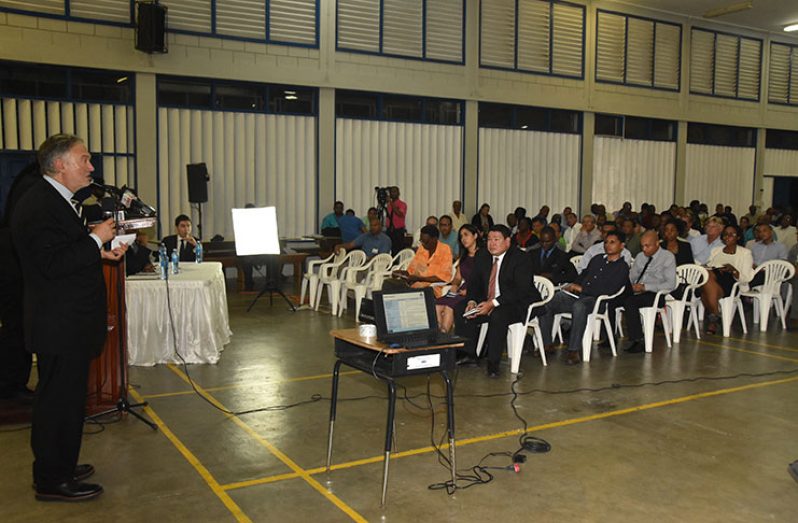….consultant forecasts negative returns
BASED on projections, it would cost the government a huge sum of US$5B to construct a standard 100 barrel per day oil refinery here.
Against this backdrop, consultant, Pedro Haas, Director of Advisor Services at Hartree Partners in the United States, suggests the creation of a robust unit within the Ministry of Finance, which should have a “technical and professional” relationship with the international oil companies exploring for oil here.
Speaking to a sizeable gathering at a consultative forum at the Marian Academy on Carifesta Avenue, where he presented the findings of a study done on the establishment of an oil refinery in Guyana, Haas suggested that the unit at the Finance Ministry should be equipped and credible enough to understand the microeconomics of the petroleum industry and be knowledgeable of the daily calculations of market prices, while being connected to the global market.
“It just requires dedication and attention to detail and an understanding of how these markets work,” he told the gathering, which included Minister of Natural Resources, Raphael Trotman.
He said that an alternative to the establishment of an oil refinery, the government’s best bet would be to maximise income from commercialising crude oil, swap or toll crude oil for products on the international market, create joint ventures with offshore refineries, as well as acquire stock in refining companies.

Haas went on to say that whether an oil company is state owned, domestic or internationally operated, from the standpoint of the government and in the interest of the State, he suggested the creation of a fiscal authority body, which would have knowledge of the market and taxes “in the proper way.” This he noted will enable a body to bring an educated discussion on the subject.
Haas said that there is a notion that persons may say, “the oil is ours and the product is ours” and “if the products are ours, we can price them at any price we want because we don’t have to follow the international market with pricing.”
According to him, when a country decides to refine oil, it is inserted into an international economy. Being an internationally priced commodity, Haas noted that if a country decides to follow the route of selling a product at a lower level, “you are subsidising it and you are sacrificing the difference between the price that you could have sold that commodity at and the price that you are selling internally at.”
A POLITICAL DECISION
Haas noted that it would be a “serious decision,” which he termed political rather than economical to establish mini-refineries. He said that oil in the ground is part of the capital spark of Guyana, but if subsidised, it would be changing capital stock into current expenditure. In response to questions posed by the audience, mainly on the establishment of mini-refineries, he said that the subject would be sacrificing value.
He said the infrastructure for setting-up mini refineries requires power, fresh water and ancillary facilities and according to him, “you are going to find the fixed unit cost of the refineries is high.”
As it relates to the cost of labour, Hass said that a refinery operating at 100,000 barrel per day is run by 300 persons, which he noted is a small number as compared to the total cost structure of the refinery. He said the largest cost is energy use and as such between the raw material that has to be transformed and the energy to run the factory are major factors.
During his presentation, Haas noted that in the past Guyana imported significant volumes of petroleum product from Venezuela. However, following the closure of the PetroCaribe deal, he said Guyana imports almost 50% of its imports from Trinidad and Tobago, with 2015 figures pointing to 6,420 barrels per day.
He disclosed too that there has been a major petroleum shift in the Atlantic Basin – the area within the region where Guyana’s oil is located. According to Haas, the region has shifted from a net importing to one that is considered a net exporting area.
The questions pose from the floor suggested that persons were upbeat as regards the establishment of an oil refinery here; some persons suggested the creation of private run refineries. However, Haas cited the costs attached to such a venture, as well as the decision which rests on the State.
During the discussion, it was suggested from the floor that Haas’ findings of the study may be a conflict of interest, since Hartree Partners is associated with the Hess Corporation, a partner to American oil giant, ExxonMobil.
However, Hass noted that indeed Hess was associated with Hartree, however the former divested its finances, which is had in the latter. “We have no relationship to Hess or Exxon, ” he said.
Hartree Partners is a merchant commodities firm specializing in energy and its associated industries. The company offers proprietary trading and arbitrage services that include identifying value in the production, refinement, transportation, and consumption of tradable commodities and anticipating opportunities in the supply chain where they may be under or over-valued.
Meanwhile, Minister Trotman informed the audience that the ministry has commenced the hiring of persons to work on the Petroleum Directorate. He said that the individuals will work on various areas within the sector.
As regards the forum, he said that he has received the report on the study from Hartree and that the ministry has received several proposals, some of which were sent to Go–Invest, for the setting up of oil refineries, but he noted that the process cannot be planned on an “ad-hoc basis”.
The services of Haas as a consultant to work with the Ministry of Natural Resources was secured earlier this year through the new Petroleum Producers Group, which was established by the Chatham House that has been involved in assisting Guyana to prepare for oil and gas production.




.png)










1 thought on “Oil refinery pegged at US$5B”
Here is my free recommendation. Don’t build a refinery. Those in charge can’t even get a sugar refinery to work, whey does anyone believe there is the capacity to make an oil refinery work. In other words, an oil refinery in Guyana is another sink hole.